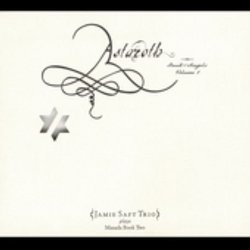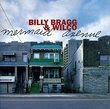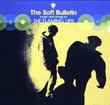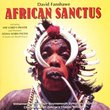| All Artists: Jamie Saft Title: Astaroth: Book of Angels 1 Members Wishing: 2 Total Copies: 0 Label: Tzadik Release Date: 6/7/2005 Genres: Folk, International Music, Jazz, Special Interest, Pop Styles: Jewish & Yiddish, Avant Garde & Free Jazz Number of Discs: 1 SwapaCD Credits: 1 UPC: 702397734826 |
Search - Jamie Saft :: Astaroth: Book of Angels 1
 | Jamie Saft Astaroth: Book of Angels 1 Genres: Folk, International Music, Jazz, Special Interest, Pop
|
Larger Image |
CD DetailsSimilarly Requested CDs
|
CD ReviewsA new beginning Michael Stack | North Chelmsford, MA USA | 07/05/2005 (4 out of 5 stars) "At the end of 2004, John Zorn wrote 300 (yes, that IS 300) songs for his Masada project, each song named after an angel. As such, the new material is Masada Book Two: The Book of Angels. The Masada pieces were written using the "Jewish" scales, which lends a sort of Middle Eastern meets Eastern European sound to the pieces. The first batch of Masada pieces was written primarily for the Masada band to play, Zorn has stated that this time, he doesn't want the music associated with a particular band, but rather wants this to be a songbook performed by a number of bands. This volume, by a piano trio led by Jamie Saft, is the first. The group, consisting of Saft (piano), Greg Cohen (bass), and Ben Perowksy (drums) largely works best on the slower pieces-- Saft's left hand is very sparse, and his right often plays single note lines, allowing Cohen to match as an even counter to his playing. When this thinness works best is when the pieces are patient in their development and the space emphasizes the mood of the pieces. Good examples of this include opener "Shalmiel" and the title track, "Astaroth". The former features great, delicate soloing from Saft where he's gently prodded by Perowksy, and in one of those perfect Masada moments, at the close of the piece, Cohen restates the descending line of the theme under Saft. The latter is a simple theme under which Cohen maintains a great circular vamp and Perowsky shows some superb cymbal work resulting in a funky and yet mellow haunting performance. Also of note is the fine "Ezeqeel", Cohen really gets into a pocket, swinging fiercely over which Saft plays beautifully, maybe his best on the record and the dark "Baal-Peor". Another example of the use of space, this one takes it a step further, as silence becomes a fourth instrument, Cohen plays counter to the leader and Perowsky is all over the map, gentle rolls and flutters and general unpredictibility keeps the piece exciting. And while admitteldy, with some of the slow tempo material being so great, some of the other feels a bit tedious ("Lela'hel") and "Sturiel" falls apart during the improv, all in all, its quite a good record. Sonically, I've been finding the mix a bit irritating-- its a very bass-heavy sound, leading the drums to sometimes sound like they were recorded in a closet-- when Perowsky works toms and bass, its fine, but the snare and cymbals feel a bit weak. On some cuts, this adds to the ambience being established, on others, it really can be a distraction. One other thing I'll comment on-- the packaging on Tzadik releases has been getting better over the past year-- this one comes in an off-white digipack featuring a beautiful ink drawing opposite the CD tray and a unique cover design with a six-pointed star cut punched out, allowing the blue CD cover to bleed through. If you're new to Masada, I'd check something from the first book first (the live quartet piece "50th Birthday Celebration Volume 7" comes immediately to mind), but if you've been waiting for this, this recording does not disappoint. Recommended." A good start The Delite Rancher | Phoenix, Arizona | 02/11/2009 (4 out of 5 stars) "Generally, there are two types of releases in the Book of Angels. There are the bombastic electronic volumes and the more contemplative acoustic groups. While "Astaroth" falls into the latter category, it should not be thought of as gentle because it is played by an acoustic trio. The band generally plays two styles of music. Songs are either straight Jazz, avant-garde or a combination of the two. Tracks like 'Ygal' and 'Pursan' play concussive, jaw breaking avant-garde while pieces like 'Shalmiel' and 'Beleth' are straight Jazz. 'Shalmiel,' 'Ariel' and 'Sturiel' stand out as highlights. While the tempo can range from excited to relaxed, the mood is very serious. It was believed that one of the ways that the demon Astaroth seduced people was by appealing to their laziness. The Jamie Saft Trio certainly didn't succumb to this vice in their tribute to the diety. While Jamie Saft (piano) is clearly in the driver's seat, Greg Cohen (bass) and Ben Perowsky (drums) play strong supporting roles. As with other discs in the second Masada Book, many of the compositions are filled with Middle Eastern scales. Because of this, there are times when Saft sounds something like a Mid-Eastern Don Pullen. While this first volume in the epic series is very good, it is not one of the most memorable releases. Releases like "Azazel" and "Lucifer" have a more distinctively Book of Angels sound. All of that written, "Astaroth" is a strong release that will especially appeal to lovers of the avant-garde with a penchant for the piano."
|

 Track Listings (10) - Disc #1
Track Listings (10) - Disc #1

